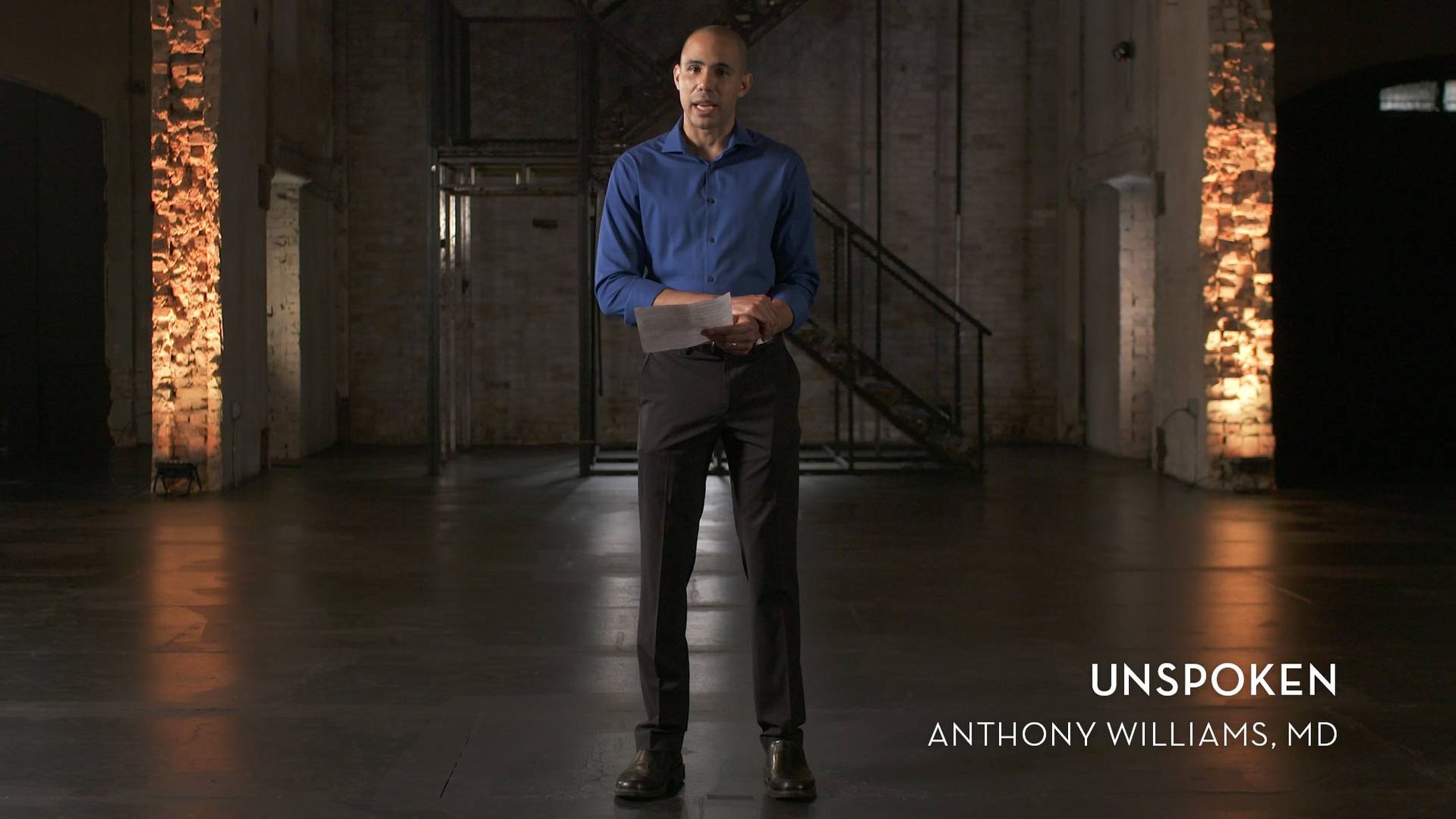So Much Remains Unspoken in This Conversation Between Two Old Friends
A doctor's story on race, inequity, identity and the pandemic.
WATCH: Dr. Anthony Williams reads his story, "Unspoken."
Dr. Anthony Williams has the bedside manner you'd hope for in an internal medicine and pediatric hospitalist: Open, friendly and finding time to talk on even the most busiest of days to share more about the impetus for his short story, "Unspoken."
Chemical engineer-turned-physician, Dr. Williams has spent most of his life focused on hard sciences and the data-driven end of the human experience. While he read fantasy and science-fiction stories as an escape, his love for storytelling eventually inspired him to heed his own call to write. "I came into stories as a consumer primarily, and as a person who used them to escape kind of a very quantitative life."
As he transitioned from engineering to medical school, he began writing as a way to expand a world away from academic pursuits. Though he may have drawn a connection here or there from his own life in his writing, it was more about creating another world that excited him. It wasn't until is final year of residency in the spring of 2020 that he turned his writing inward.

Underneath Unspoken
In his story "Unspoken," Williams never once mentions the pandemic by name, but instead turns the lens on a seemingly simple conversation with a childhood friend - a dialogue clearly divided by the glass of the visitors phone booth in prison.
"I felt that the pressures of the pandemic are inseparable from the pressures and stressors of being an underrepresented minority in this country," he says. "I just wrote on essentially how I felt that the pandemic was exacerbating a lot of things that I've already dealt with, and lot of people have already dealt with just to get to where they are."
Looming behind the conversation is the impact of history acknowledged and buried, along with questions about sweeping societal questions. Themes of racial and systemic inequities, the medical industry's failure to build trust within communities of color, suffering, regret and success weave through the conversation.
"When we tell a story and we stitch together what seems to be a linear series of events, a lot of those events have a huge kind of history or social perspective behind them," he says.
Read the Manuscript of "Unspoken"
"What's up, man. How you been? He put his fist out in our traditional greeting as he picks up the phone. I return the gesture and pick up my phone. Thick glass separates our knuckles.
"Can't complain. You?"
The wardrobe of obligation is mostly scripted pleasantries.
"Alright. You know, still awhile before I'm out, but I'm making it. How's the wife and fam?"
"They're good."
My Uncle is dead. My mom is devastated. Not just at the loss of a brother, but at the fact that he feared going to the doctor so much he didn't even try. It's the first time I've ever seen what untreated HIV can do.
"Sis' is pregnant again." I tell him.
My wife is sick and has been on home oxygen for the last four months. I cry most nights for no reason. I can't imagine bringing a kid into this. Life feels like a ruck march through Hell, but only the gentrified parts. It could be worse. I have no right to complain.
A rare smile split the hard lines of his face. "Oh shit, man. That's awesome!" In the third grade he and his brother lived with my family for a month. My sister's kindness was something he never forgot. After they moved out, he paid us back in the only way he knew how: by buying us protection in the neighborhood with bloody knuckles and missing teeth. "Boy or girl?"
"She doesn't know yet."
"Well, tell her I said congratulations."
"I will."
"So, how's that sweet doctor life treatin' you?"
I smile and hope it looks genuine. He doesn't watch medical shows so there are no pre-existing concepts to leverage. I could explain the difference between residency and being a 'real doctor' but we only have twenty minutes.
I hedge on the answer. "It's pretty good. A lot of work."
I never thought impostor syndrome would be the punchline to my life. What do you get when you mix responsibility, discipline, and an unhealthy amount of anger with respectability politics? A black doctor, apparently.
He looks contemplative and unconsciously thumbs the set tattoos scribbled across the back of his hand. "I can only imagine." I don't know if he senses my discomfort or is reacting to his own, but he changes the subject. "That book you sent me was awesome! You got any others?"
"I'm glad you liked it."
It was the most violent book I've ever read, but it wasn't the killing that made me think of him. It was how little control the anti-hero had over his own arc.
"Yeah, there are a few others I can send you."
"Cool! You gonna see anyone else while you're in town?" He'd gotten better at feigning nonchalance.
"Your mom, of course." The knowledge that his own mother no longer speaks to him hangs between us. "I'll make sure she's alright."
I dread the visit. She will tell me at least ten times how proud of me she is. It is never said, but I know she compares her sons to me, and finds them wanting. I wish I could tell her that I don't view their lives as wasted. I view mine as an accidental coincidence. I had two parents and a stable home. And still, I would be dead or in prison if not for her sons and a good deal of luck.
"Any idea when you'll be out?" I ask him. He talks for awhile but never really answers the question.
We talk about old times. About watching movies and playing ninja turtles in the backyard. We stay away from dead friends. When our time is up, we end with promises of staying in touch that neither one of us will keep.
I watch the complex emotions play out in subtle twitches across his face. In this place, the relationship between vulnerability and life expectancy is inverse, so he keeps his tone gruff. "I appreciate you comin' by."
I nod with appropriate manliness, even as my heart twists. He doesn't know why I still come. His unspoken confusion is a testament to how well this country mind-fucks those on the margins. This side of the glass is only for those who chase the horizon and earn privilege.
He doesn't know that the horizon is constructed from the sacrifices of the valueless, and never will. I don't feel pride in my accomplishments. I feel crushed by the obligation to never forget.
Dr. Anthony Williams is an Internal Medicine and Pediatrics Hospitalist for HealthPartners, and the Associate Program Director of the Internal Medicine and Pediatrics Residency Program and an Associate Director of the Center for the Art of Medicine, both at the University of Minnesota Medical School.
Special Thanks: Jon Hallberg, MD
Production Crew: Slade Kemmet, Eric Pagel, Miles Painter, Jennilee Park, Brittany Shrimpton, Brennan Vance
Hippocrates Cafe: Reflections on the Pandemic is a TPT Partnerships coproduction with the Center for the Art of Medicine at the University of Minnesota Medical School.

This story is made possible by the Arts and Cultural Heritage Fund and the citizens of Minnesota.
